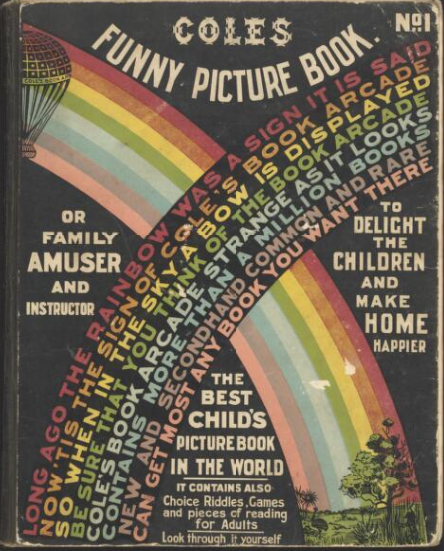Around the end of the 19th century, Melbourne, Australia, hosted one of the biggest – and certainly the most carnivalesque – bookstores in the world: Cole’s Book Arcade.

Spencer Shier, CC0, via Wikimedia Commons
[Content warning: discussions of suicide.]
Growing up I read and re-read a set of children’s books that my father was given when he was a child. Cole’s Funny Picture Books had a broad rainbow on the cover and contained a miscellany of poetry, comics, puzzles, games, and jokes. The first volume was published in 1879. So, as you can imagine, some of the humour and pictures have dated horribly. But much of its outlook is surprisingly modern: the picture books railed against superstition, smoking, and white supremacy.

E.W. Cole(Life time: 1918), Public domain, via Wikimedia Commons
The creator of these books was Edward William Cole of Melbourne, Australia. He was not only an author – he was also the founder of one of the 19th century’s great book stores: Cole’s Book Arcade.
Cole opened his first bookstore in 1865. As he sold books he used to profits to acquire more, and as he acquired more he moved to larger premises to accommodate the growing collection. By the 1880s the bookstore encompassed an entire arcade, and claimed to have more than two million books in stock.
In reality it did not have two million books. But Cole had a flair for publicity, and hyperbolic claims notwithstanding it was – at the time – one of the largest bookstores in the world. In addition to the books, it had a candy store, performing monkeys, a live band, mechanical automata, and a salon to encourage public discourse. Cole understood that getting people in the door, and keeping them inside once they were there, was better for business – and better for people – than any kind of penny pinching. Signs encouraged people to browse, or stay and read, as long as they wanted. The arcade was a 19th century literary nirvana / carnival.
(Cole’s bookstore was also a frequent target of book thieves. One Presbyterian minister stole more than forty classical texts over a year and a half; when he was caught in 1894 he cut his wrists on the morning of his trial and died a few days later.)
Cole was particularly active on social fronts. He was a frequent and vocal critic of the White Australia policy (which attempted to restrict or ban immigration from non-White countries). His simple point: that people are people, and treating them differently on the basis of race just didn’t make any sense. In 1901 he wrote:
Holding as I do, the Oneness of Man, I am much interested in the present burning question of a “White Australia,” and with all respect I think that it has not been sufficiently looked at in all its aspects. I know that the feeling is strong, and almost universal against the coloured man; but I also know that there is no material difference between the white man and the coloured.
White Australia Impossible
Cole died in 1918; his arcade closed ten years later.